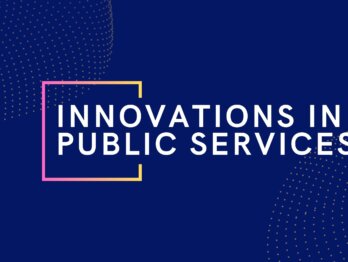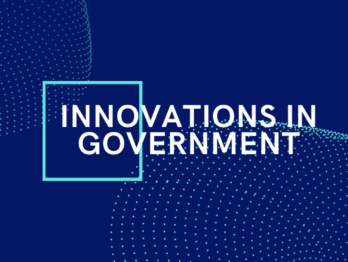Embracing Innovation in Government: Global Trends 2018

We are happy to announce that OECD Secretary-General Angel Gurría launched OPSI’s report “Embracing Innovation in Government: Global Trends 2018” today at the World Government Summit! The event in Dubai is the largest annual gathering in the world focused on shaping the future of governments through innovation. The report is the result of a global innovation review conducted by OPSI in partnership with UAE’s Mohammed Bin Rashid Centre for Government Innovation (MBRCGI). The review included extensive research and a worldwide crowdsourcing initiative, a global Call for Innovations. The report contains in-depth case studies on 10 of these innovations to illustrate the key trends identified through the review.

Check out the report at here: http://oe.cd/innovation2018
As you may recall from the summer, we held an open Call for Innovations where the world was invited to let us know about creative and exciting innovations occurring in government. The response was incredible. We received 276 cases of inspiring and impactful innovative initiatives from 58 countries. To the incredible teams around the world who submitted examples – thank you! We combined what we learned from the submissions with extensive research and interviews with innovation experts from many different fields to produce Embracing Innovation in Government: Global Trends 2018.
This is the second report on global trends that we produced in partnership with the MBRCGI. The first Global Trends report was launched at last year’s World Government Summit. That report identified six trends that demonstrated tremendous progress by governments to create innovative programs and initiatives. The 2018 report builds on the trends identified last year and examines how governments are taking steps to build the infrastructure needed for more impactful systems-wide transformation, while also considering all citizens and residents affected by government and working to build a more inclusive society that better establishes a baseline for wellbeing for all people.
In particular, we found that governments are:
- Building digital identity solutions as a foundation for new services, supporting people and businesses to express their unique identities, and spurring new discussions on national identity.
- Embracing systems approaches and enablers to lead a paradigm shift in how services are provided; transforming and re-aligning the underlying processes and methods of the business of government.
- Fostering better conditions for inclusiveness and vulnerable populations, in order to address complex current and future problems, and to create a world in which no one is left behind and everyone has access to opportunities for a better life.
Each of these trends includes a discussion of key underlying themes observed by OPSI, as well as a series of recommendations to help governments unlock innovation. Each section of the report also has in-depth case studies of the trend in action that are a direct result of the Call for Innovations. The case studies in the report are:
|
Identity | Aadhaar (India) – the world’s largest biometric identity program (1.2 billion Indians). Highly innovative in its rapid scaling to access public and private sector services, but also highly controversial among privacy and security advocates. |
| Be Badges (Belgium) – a digital platform where employers, schools and others can formally recognise individuals’ experiences using Open Badges. Badge-earners can share their badges with others and the labour market, and employers can access the platform to find new employees. | |
| Australian Trade Mark Search (Australia) – a revolutionary image recognition and AI tool to help companies to create a brand that serves as a critical foundation upon which their businesses can be built, and helps distinguish their identity and their unique products and services in the marketplace. | |
| The World’s First Data Embassy (Estonia) – servers stored in other countries that fall under Estonian jurisdiction. Copies of key databases are stored there and can be accessed in the event of a major incident. Through this initiative and others, Estonia is becoming a “country without borders”. | |
|
Systems approaches and enablers | APEX (Singapore) – a whole-of-government platform which establishes common application programming interfaces (APIs) that allow public agencies to share data with other agencies and private entities through a user-friendly portal that even non-technical staff can use. |
| Predictiv (United Kingdom) – an online platform for running behavioural experiments. It enables governments to run randomised controlled trials (RCTs) with an online population of participants, and to test whether new policies and interventions work before they are deployed in the real world. | |
| Free Agents and GC Talent Cloud (Canada) – aims to become a validated, searchable repository of cross-sector talent. It envisions a digital marketplace where workers have flexibility to choose work project-based work inside and outside government, as offered. | |
|
Inclusiveness and vulnerable populations | Seoul 50+ policy (Republic of Korea) – an innovative convergence of social welfare, employment and life-long learning policies, geared towards addressing the needs of an ageing society; redefining the meaning of “work” in an era of ageing populations. |
| Financial Inclusion Programme for Migrants (Mexico) – an innovative financial services initiative that provides bank accounts and other support at mobile border branches to a unique set of migrants – Mexican citizens repatriating from the United States amid a political climate that has added a great degree of uncertainty to their lives. | |
| Asker Welfare Lab (Norway) – a new concept for service delivery centred solely on the citizen, where all relevant municipal services together with external partners – the Investment Team – invest jointly in a person’s welfare. The lab adopts an investment mind-set and treats citizens as co-investors. |
We discussed these initiatives with their representative innovation teams and leaders and learned a lot about the challenges they have faced, the lessons they have learned, and the impact that their work has had on the everyday lives of the people they serve. We left these meetings inspired and hopeful for the future that can be brought about through innovation. In some cases, we also saw unanswered questions that some of these innovations raise, critical issues that need to be further discussed, as is the case with most transformative innovations. We have documented our findings in the Embracing Innovation in Government: Global Trends 2018report, and we look forward to watching how these trends unfold in the future.
Check out the high level summary Global Trends 2018 flyer for at-a-glance info. Want to know more about the trends, recommendations, and cases? Check out the full report.
Why study innovation trends?
Our mission at OPSI is to serve as a forum for shared lessons and insights into the practice of innovation in government. In a time of increasing complexity, rapidly changing demands, and considerable fiscal pressures, governments need to understand, test and embed new ways of doing things. One of our key objectives in achieving our mission is uncovering emerging practices and identifying what’s next. This involves identifying new practices at the leading edge of government, connecting those engaging in new ways of thinking and acting, and considering what these new approaches mean for the public sector. By being armed with information on what other governments are doing, public sector innovators can learn from the successes and lessons learned from others and determine whether such approaches could work in their own context. This is especially important in the rapidly changing field of innovation, where the margin of error can be unfortunately small. By conducting this review, we seek to diffuse new and interesting ideas and bring together a growing community of innovators to share novel thinking and initiatives to help governments at all levels move forward together. This helps us to give countries critical, practise-led advice on public sector innovation.
Follow along live
The World Government Summit can be found here. The Summit will be livestreaming many of the events from @WorldGovSummit and on YouTube, including a keynote speech by Secretary-General Angel Gurría on Sunday 11 February at 10:20am Dubai time (7:00am Central European Time). Other speakers include:
- Arianna Huffington, Founder and CEO, Thrive Global
- Michio Kaku, Theoretical physicist and futurist, City College of New York
- Malcolm Gladwell, globally renowned author
- Francis Fukuyama, Political scientist, economist, and author; Stanford University
- Christine Lagarde, Managing Director, International Monetary Fund
- Jim Kim, President, The World Bank
- Roberto Azevêdo, Director General, World Trade Organization
Get inspired and start preparing your own innovation case for OPSI today!
Connect with us
Interested in public sector innovation? Feel free to get in touch with us at [email protected] or @OPSIgov. We also encourage you to join our OPSI LinkedIn community to exchange ideas with fellow innovators and our newsletter to receive innovation updates.












